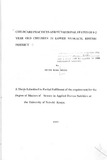Child care practices and nutritional status of 0-2 year old children in lower Nyakach, Kisumu District
Abstract
This study aimed at determining the various childcare
activi ties performed by caregivers, time allocation for
childcare activities and nutritional status of children
aged 0-2 years.
A descriptive cross-sectional study was carried out between
October 1992 and early January 1993. The methodologies used
in data collection were focus group discussion, interview,
participant observation and anthropometr ic measurements.
The sampling frame was made up of households with children
aged 0-24 months, and sampling was through multistage
sampling technique.
The findings of this study show that important childcare
activities according to maternal rating of activities were
cooking for the child (46%), care of child's clothes (29%),
care of child's body (14%) .and feeding the child (7%).
The activities that were reported to be taking much of the
mothers' time were care of child Is clothes (reported by
90%), cooking for the child (reported by 43%) and feeding
the child (reported by 17%). However, observation results
indicate that comforting the child (76 minutes per day) and
breastfeeding (53 minutes per day) were the two most time
consuming childcare activities. These two activities were,
xiv
however, not rated high among
activities by the mothers.
important childcare
When mothers do not have enough time for all the childcare
activities, they use various methods in different
activities to save time. In looking for food, most mothers
(63%) reported stocking enough food in the house as a way
of saving time, while the majority (77%) save time in
fetching fuel by fetching a lot to be used once in a week.
The use of a wheelbarrow or donkey was reported by the
majority (39%), as a way of saving time in fetching water.
Some of the reported time-saving methods, for example,
cooking food for more than one meal, could however be
harmful for the child's health and nutrition, noting that
in a rural community, facilities such as refrigeration are
not available for food storage.
High prevalence of malnutrition was noted in the study area
where stunting (27%) was the common form of malnutrition at
all ages, especially among the male (38.9%) children. There
was a weak correlation between the child's nutritional
status and the mean time for childcare activities which was
not statistically significant (p<.05), hence the study
concluded that nutritional status of a child does not
depend only on the care given to the child by the
caregivers, but on other factors.
Citation
Master of Food Science, Nutrition and Technology, University of Nairobi, 1993Publisher
Department of Food Science, Nutrition and Technology, University of Nairobi
Description
Msc Thesis

